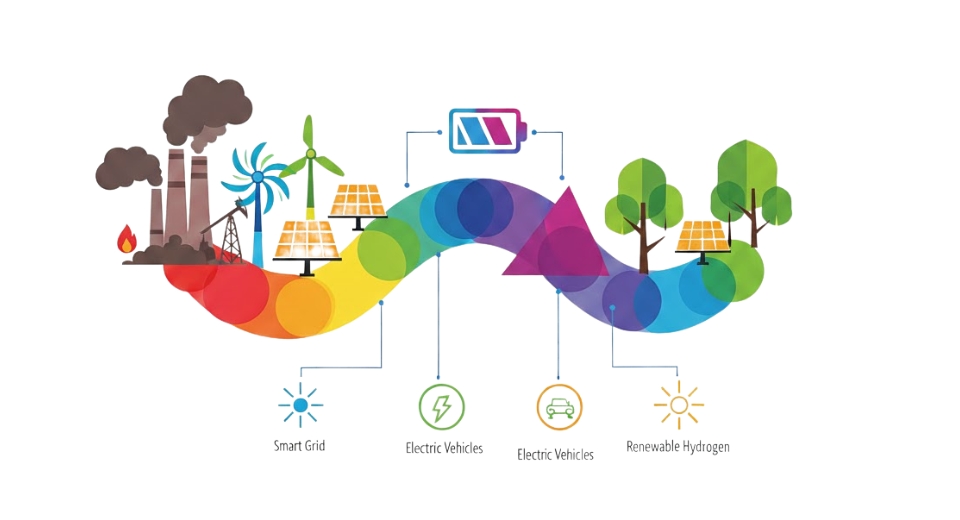
Nov 22, 2025

The global energy transition market as demonstrated by the Metastat Insight has become one of the central themes in public discussions just when the world is slowly getting used to the new energy requirements, high-tech materials, and efficient infrastructures. The talks on such areas as transport, manufacturing, and no building maintenance are now happening in the most important places of society like daily lives, offices, and decision-making. The adoption of cleaner energy systems is not because of the technology interests but rather the need of getting results with practical means and simplified solutions which are therefore a common issue in all sectors and neighborhoods.
Market Context
Many industries have already suffered from the unpredictability of supply, suffered operational risks, and relied on conventional energy sources. However, the old ways have been holding the operation back while the resources at times of changing quality have a substantial impact on the company's ability to adapt. The environmental requirements for the production process have been marked as a sign that the industry has to keep up with the efficiency through new ways. This market is a driving force of that transformation because it provides the technologies and solutions that entail long-term environmentally friendly operational models planning. As the companies are promoting the establishment of energy strategies that are both stable and flexible to meet the demands of the modern world, this sector facilitates the strengthening of the supply lines that are less prone to being disrupted.
How It Works / Why It’s Valuable
The solutions that this market offers can support the transition from centralized to decentralized power generation, the use of cleaner fuels, digital optimization, and advanced storage methods, all of which are increasingly being accepted.
Growth Story / Technological Evolution
The growth of this market reflects steady acceptance across manufacturing facilities, transport sectors, and urban development projects. Early adoption stemmed from specialized applications seeking alternatives to traditional supply models. Gradual integration followed, driven by improved performance, higher reliability, and broader accessibility. Breakthroughs in storage capabilities and digital management platforms accelerated interest by demonstrating measurable gains in efficiency and longevity of energy assets.
Advances in material science, software automation, and low-emission technologies further reinforced the standing of this market. Cleaner fuel technologies grew more refined, while digital tools enabled real-time decision-making in complex networks. Infrastructure modernization programs across several regions highlighted the potential of integrated renewable systems, helping organizations transition from conceptual trials to wide-scale deployment. As improved designs reduce installation and maintenance difficulty, adoption continues to spread across sectors with varied operational profiles.
Regional or Global Trends
Adoption trends vary across regions based on industrial maturity, infrastructure readiness, and policy landscapes. Regions with strong manufacturing bases show substantial interest due to ongoing modernization efforts. Established urban corridors integrate cleaner systems to reduce congestion, improve building efficiency, and support large-scale sustainability programs. Some regions also prioritize local energy generation to reduce dependence on long-distance supply routes.
Emerging areas display strong growth potential due to rising construction activity, new industrial parks, and expanding transport networks. Many regions invest in decentralized power solutions to support rural communities or remote operations where traditional grids face limitations. Collaborative initiatives between governments, technology providers, and industrial operators expand opportunities for technology trials and pilot deployments. As new markets seek cleaner pathways for expansion, demand for advanced systems continues to rise globally.
Challenges and Opportunities
Cost barriers still influence decision-making, particularly for organizations managing legacy infrastructure. Regulatory differences create uncertainty around planning horizons, slowing implementation in certain regions. Competition among technology categories also affects investment choices, requiring careful assessment of long-term compatibility.
However, opportunities outweigh constraints. New materials reduce manufacturing expenses while extending equipment lifespans. Digital tools increase transparency, enabling organizations to optimize usage patterns and address inefficiencies that previously went unnoticed. Synergies with construction technology, mobility innovation, and industrial automation open new routes for collaboration. Growing interest in hybrid systems strengthens the market’s strategic position, creating new prospects for service providers and equipment manufacturers across the value chain.
Why It Matters Now
Modern industrial activity relies on stable, sustainable, and adaptable energy systems. Rising interest in cleaner solutions aligns with global goals related to environmental responsibility, corporate sustainability programs, and community welfare. Digital transformation amplifies the importance of reliable energy, as connected devices and automated workflows depend on consistent and efficient power. Health concerns linked to poor air quality reinforce the movement toward cleaner processes, while large organizations pursue long-term strategies that balance growth with stewardship of shared resources.
The global energy transition market presented by Metastat Insight therefore stands at an influential intersection of technology advancement, sustainability aspirations, and practical industrial needs, shaping future infrastructure and guiding industries toward cleaner and more resilient operational models.
Drop us an email at:
Call us on:
+1 214 613 5758
+91 73850 57479